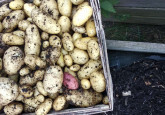Many women experience pain every month as their period approaches, and throughout it. These pains, which often take the form of cramps, headaches or backaches, are often linked to a hormonal imbalance and can quickly prove to be very disabling in everyday life. Here are 6 herbal remedies for painful periods, used in ancient times to restore balance to the body and soothe these very particular sufferings.
Before discussing the benefits of these plants, it's important to note that they can be harmful during pregnancy. Consumption should therefore be stopped at the same time as menstruation for the duration of the pregnancy.
- Sage :
Sage is sometimes referred to as the plant associated with feminine ailments par excellence: historically used to soothe painful periods, it is also used to treat disorders associated with the onset of menopause, such as night sweats and hormonal imbalances. This herbaceous perennial plant, which grows naturally in the Mediterranean basin, owes these properties to the large quantity of phytoestrogens it contains, molecules very similar to estradiol, the estrogen most commonly produced by women. Regular consumption helps relieve menstrual pain by naturally regulating hormone production. Sage also has an antispasmodic and anti-inflammatory action, reducing the sensation of cramps in the lower abdomen. Regular use in the form of infusions or dietary supplements not only soothes pain, but also makes cycles more regular. At the time of menstruation, it is generally recommended to drink at least three cups daily.
- Alchemilla :
Like sage, alchemilla is one of the plants associated with women's ailments and has very interesting properties for soothing painful periods. Also known as "Notre Dame's mantle", this plant has a high concentration of lutein, a molecule that simulates the action of progesterone in the body. It thus helps regulate the menstrual cycle naturally. It is also renowned for reducing bleeding periods. Alchemilla protects the uterus in general. It is recommended to start taking it during the week preceding the onset of menstruation, either as an herbal tea or as drops taken directly on the tongue. In the former case, between one and four cups of infusion a day are recommended. For the latter, between 40 and 160 drops are needed, twice a day.
- Chaste tree :
Chasteberry has real virtues for soothing painful periods and, more specifically, disorders linked to premenstrual syndrome. Dried chaste tree berries regulate hormone production by simulating the presence of progesterone in the body. This plant also soothes the negative emotions and irritability that naturally occur during premenstrual syndrome, and combats water retention and classic menstrual symptoms such as headaches and breast pain. Chasteberry is therefore highly beneficial and can be used in cases of irregular cycles, heavy bleeding or spotting, i.e. blood loss outside the period. It is most often taken as a liquid extract, but is also available in powder form. In this case, infuse one to three tablespoons of chasteberry in a liter of boiling water and drink two or three cups every morning. As this product acts on hormones, however, it is important to consult a doctor before taking it on a regular basis.
- Chamomile :
There are different varieties of chamomile, and two of them seem particularly effective in soothing painful periods. Firstly, chamomile matricaria, also known as German chamomile, promotes sleep and soothes stomach aches in general. Its action concerns both digestive disorders and uterine pain, which it helps to soothe over the long term. On the other hand, feverfew, with its proven anti-inflammatory properties, helps combat painful periods and headaches associated with the menstrual cycle. In both cases, these plants can be taken as herbal teas, dry extracts or liquids.
- Raspberry :
Raspberry is also one of the ideal plants to accompany the different stages of a woman's life cycle. Like chasteberry and alchemilla, it has antispasmodic properties that calm cramps, and plays an active role in regulating hormone production. Rich in minerals, vitamins C and E, iron, potassium, folic acid and calcium, raspberry is renowned for its toning action on uterine muscle and ligaments. In addition to soothing menstrual pain, regulating cycles and rebalancing hormone production, it also prepares the body for childbirth. This plant can be taken as an infusion (several cups a day) or as gemmotherapy.
- Yarrow :
This plant is also one of the best known for its antispasmodic effects. Yarrow also stimulates the production of progesterone, which helps reduce pelvic and abdominal cramps and the general sensation of painful periods. This plant contains a large quantity of flavonoids, which help regulate hormone production and block the manufacture of estrogen. Yarrow is an excellent natural remedy for calming heavy, thick periods and decongesting the endometrium. This plant also acts as a powerful anti-inflammatory with relaxing effects. It can be taken as an herbal tea, in drop form or as an essential oil for use in a bath.
Would you like to buy these plants?
Ecosystem Laboratoire has a partner, the Jovia company, which offers a wide variety of herbal teas! Made in France, Jovia herbal teas are presented in "bulk" format in resealable bags, and are of exceptional quality! In the Jovia herbal tea range, you'll find 5 of the 6 plants presented in this article, including chamomile and sage for example! If you'd like to try them, now you know where to find them!










